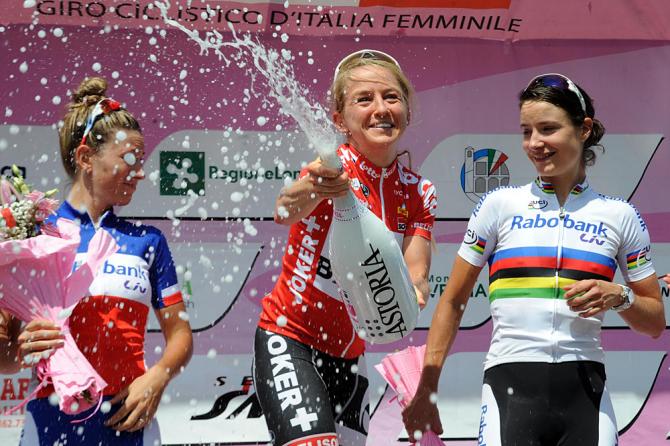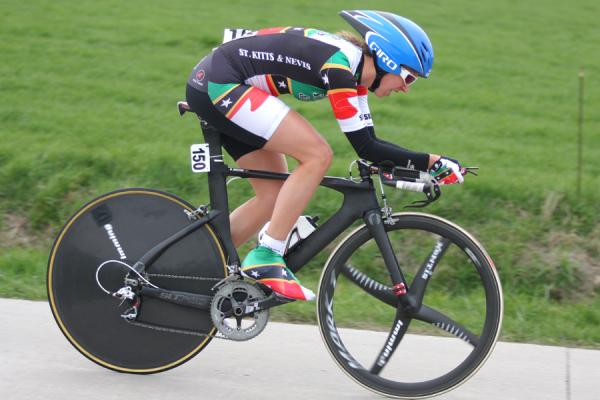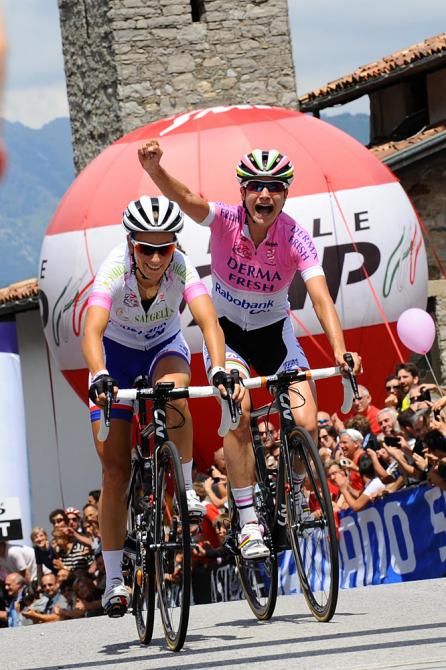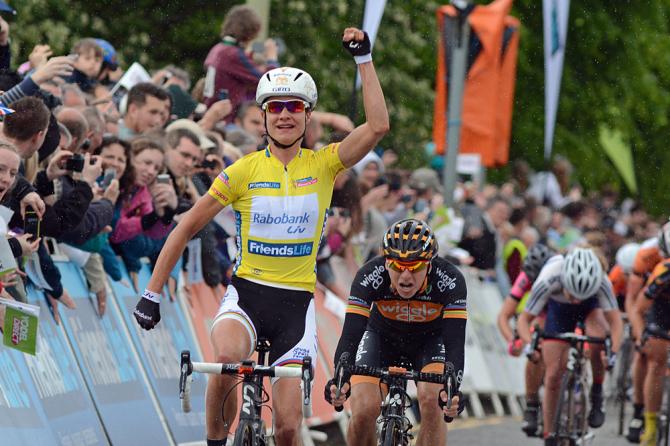La Course by Tour de France an equalizer for women
Founders will reap the rewards of their work




It has been 18 years since women racers have shared in the prestige that the name Tour de France brings to cycling — in 1998 the stage race called Tour de France Feminin was stripped of its title by the ASO — but on July 27, 2014, that all will change when La Course by Tour de France lines up the best female racers in the world to race a criterium on the Champs-Élysées, albeit many hours before the arrival of the professional men.
It's a baby step, a toe in the water for founders Kathryn Bertine, Emma Pooley, and Marianne Vos, who will all be on the start line, reaping the rewards of their hard work in making the race happen.
Cyclingnews spoke with Bertine, a former professional triathlete and journalist turned road racer, who will line up with the Wiggle-Honda team on Sunday, about the inception of the race.
The motivation to make this race happen was not new - many women have gotten into the sport and found themselves reeling by how little they got in comparison with their male counterparts, but Bertine had a plan and became the catalyst to see it through.
"When I started racing at the elite level in 2008, I was blown away by the lack of parity between men's and women's cycling and I wanted to do something about it," Bertine said. "As a journalist, I had just finished a two-year cycling series on ESPN, and on a personal level, I was trying to go pro. In 2009, I formulated a business plan as to why a women's event at the Tour de France would not only be a smart idea in terms of societal gains, but also financially lucrative."
Not one to be intimidated by the powers that be, Bertine boldly tried to get her plan in front of the Tour de France race director Christian Prudhomme, but lacking a cycling pedigree, she struggled to get any attention.
So she did what any good journalist would do: she immersed herself in the scene, gathered up enough material to create a documentary film called Half the Road, and built relationships with the top riders: Pooley and Vos. She asked them to join her in lobbying for a women's Tour de France. A triathlon colleague, four-time Ironman champion Chrissie Wellington, got in on the project, too, and thus Le Tour Entier was born.
Get The Leadout Newsletter
The latest race content, interviews, features, reviews and expert buying guides, direct to your inbox!
Timing helped: it was 2012, and the London Olympics had just produced one of the most thrilling women's races in recent memory in front of millions of fans. Momentum was building.
"I suppose you could say I initiated it, but it never would have happened without the right team of players. If you want to change the world, you're going to need a team. The right team! Nothing great is ever achieved alone.
"We had quite a platform of powerful women. We drew up the petition and a mission statement and a website to show how exactly a Tour de France for women could and should be executed, and that we wanted to help them build this race. Our tactic with the petition was to show ASO that the world would back such a proposal."
They peppered the social media channels with appeals to sign their petition, and the world responded: almost 100,000 signatures came in the first month.
The movement got the attention of the ASO, and they agreed to a meeting last October. It didn't hurt that the UCI management had just changed, and the new president Brian Cookson had women's cycling as one of the top priorities in his manifesto.
A few months later, La Course was announced - on one hand, it is a milestone for women, to be on the same stage as the men. But on the other, the race will occur a full five hours before the men arrive, and the race will be over well before the men even roll to their start line 137.5km away, and even before the publicity caravan approaches Paris.
Still, the fans will be sure to have already lined the Champs-Élysées, and the women will be keen to put on a good show and demonstrate how exciting they can make a race when they tackle the 13 laps of the circuit, .
"We want to grow this race into a full stage event someday on parallel with the men," Bertine said. "We understand the infrastructure of the women's side of the sport has to be able to sustain this, budget-wise, but our physicality isn't the issue -it's the sponsorship and investment. We hope to win the hearts of sponsors through our exposure at La Course, and we want to work with ASO to help make it happen.
"People believe it is the race director and promoter's job to coordinate sponsors, but it is our job as athletes to win the hearts of our fans, viewers and audience. So we'll do our part! I know every female pro cyclist has a lot of heart. Now it's time to show it."
The ASO has made special arrangements to put a decidedly female focus on the race, announcing that the police brigade that will precede the riders along the course will be all women, and the race jury will also be 100 per cent female.
Prize money for the race will be €22,500, the same amount for the stage from the professional men's field. The men get their proper place, manning the chalk board to give time splits during the race and as hosts for the podium ceremony.
Bertine is looking forward to lining up in the race that she helped to create, and although she has realistic expectations for her own personal performance, she expressed a great deal of gratitude to have the opportunity.
"It is impossible to change the world without changing your own private universe as well. But I have to believe that our dreams are worth our struggles. Otherwise, what do we live for? So yes, when I stand on that start line in Paris as a member of Wiggle-Honda, there might be a few riders who are faster sprinters or better climbers. But I will do my job for my team, and there will be no one happier. If they made a Happiest Rider jersey for La Course, no one could challenge me for it. Not even Vos."
The women line up at 12:50 Paris time. The race will be broadcast live on Eurosport in the UK, and on Universal Sports in the USA.

Laura Weislo has been with Cyclingnews since 2006 after making a switch from a career in science. As Managing Editor, she coordinates coverage for North American events and global news. As former elite-level road racer who dabbled in cyclo-cross and track, Laura has a passion for all three disciplines. When not working she likes to go camping and explore lesser traveled roads, paths and gravel tracks. Laura specialises in covering doping, anti-doping, UCI governance and performing data analysis.